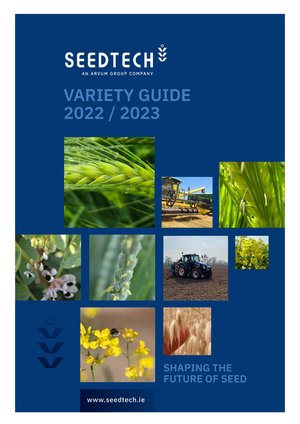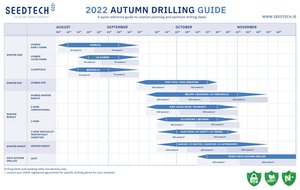Ireland
June 15, 2022

Sowing for Success
Seedtech has identified three crucial varietal attributes to look for when choosing which varieties and crops to sow this autumn.
These, along with detailed agronomic characteristics, will help you choose the most suitable varieties for your farm. Seedtech has created three icons to denote the varieties that have achieved this important ranking to support decision-making by farmers.
Farmers can use the rating system of YIELD SECURE, N+ ADVANTAGE, and SUSTAINABLE CROPS along with Seedtech's Autumn Drilling Guide to help them make informed decisions this autumn.
Seedtech's Autumn Drilling Guide can guide drilling crops near the optimum drilling dates, help use machinery efficiently and manage weather variations as we look to get the right crops into the ground.
By starting to drill autumn crops in mid-August with winter oilseed rape and finishing in mid-November with winter oats, farmers have a 14-week drilling window for autumn sowing. The Seedtech variety portfolio offers proven choices to help reduce risk within this 14-week drilling window.

Choosing for Secure Yield
YIELD SECURE is the gold standard for a Seedtech variety and is awarded to varieties that are proven to consistently deliver profitable yields and reduce risk to the grower in independent trials and on farms over the years.
It is also important to look beyond Relative Yield, so lodging resistance, the ability to drill early, early season disease resistance and other important traits are all part of SECURING YIELD and reducing risk on farm.
It is easy to see how varieties like BELFRY, HUSKY, LYNX, and GRAHAM are the No.1 choice for growers. However, varieties like LG CASTING, KWS JOYAU, SY AMITY, and KWS TAYO also SECURE YIELD and are equally reliable when used in the right situation, as shown in the booklet and on our website. This is especially important for candidate varieties.

Choosing for N+ ADVANTAGE
Varieties (or crops) that reduce the nitrogen fertiliser bill on farm and can reduce N-leeching to the environment are awarded N+ ADVANTAGE, e.g., WOSR can utilise up to 100 kg/ ha N over its winter growth.
AURELIA WOSR can also significantly reduce nitrogen on farm. This is because AURELIA (and all WOSR) can utilise residual nitrogen left over from the previous crop and, when combined with autumn sunshine is 'stored' in the rape plant over the winter, to be released the following Spring, saving on nitrogen.
LYNX Beans, with their nitrogen creating nodules, help grow the bean crop and leave a nitrogen residue for the following cereal crop.
KWS TAYO and KWS SERAFINO hybrid rye are varieties that can produce a huge volume of grain and straw relative to their nitrogen requirement. This is due to the vigorous roots of hybrid rye which can eke out fertility where other crops may not grow as well. It is also because hybrid rye may not be affected as much by take-all, which improves its rooting mass.

Choosing Sustainable Crops
For tillage farmers, planning is fundamental to delivering a sustainable solution. Optimising soil health, rotation planning, and incorporating appropriate break crops, are the foundation of our trialling system on our farm in Faithlegg.
Choosing a variety with proven and robust disease or pest resistance is sustainable and can significantly save on inputs.
Sustainability in Action

KWS Joyau (BYDV Tolerant) variety
Seedtech is collaborating closely with our breeding partners to bring new value-add seed genetics and traits to the market such as:
-
BYDV tolerance in KWS JOYAU reduces the risk of BYDV in situations where aphid sprays are not effective or sufficient
-
Mildew resistance in LG CASTING reduces the need for early fungicides to maintain tiller numbers
-
Drilling BELFRY Hybrid Barley as a second barley as the stubble will have Rhynchosporium carry-over, and hybrid vigour helps to overcome the challenge and deliver a profitable crop
-
Growing LYNX Spring beans and other break crops, HUSKY Oats and AURELIA WOSR. This will allow first wheats to yield higher and use less inputs per tonne of grain, contributing to sustainability by producing more from less
-
Growing KWS TAYO or KWS SERAFINO Hybrid rye or BELFRY hybrid barley instead of a second wheat reduces inputs required for take-all and again produces more from less
-
LAUREATE Spring malting barley is an exceptionally clean barley to grow and offers growers savings on fungicides
-
Drilling early and spreading the workload are sustainable measures as they help carve out valuable time with family and friends


Winter Crops Overview